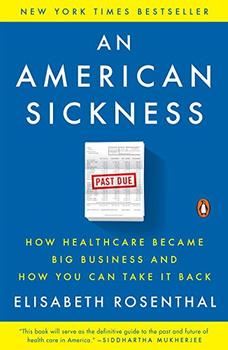Summary | Excerpt | Reviews | Beyond the Book | Readalikes | Genres & Themes | Author Bio
How Healthcare Became Big Business and How You Can Take It Back

Critics' Opinion:
Readers' Opinion:
First Published:
Apr 2017, 416 pages
Paperback:
Mar 2018, 432 pages
 Book Reviewed by:
Book Reviewed by:
Kim Kovacs
Buy This Book
Excerpt
An American Sickness
In the past quarter century, the American medical system has stopped focusing on health or even science. Instead it attends more or less single-mindedly to its own profits.
Everyone knows the healthcare system is in disarray. We've grown numb to huge bills. We regard high prices as an inescapable American burden. We accept the drugmakers' argument that they have to charge twice as much for prescriptions as in any other country because lawmakers in nations like Germany and France don't pay them enough to recoup their research costs. But would anyone accept that argument if we replaced the word prescriptions with cars or films?
The current market for healthcare just doesn't deliver. It is deeply, perhaps fatally, flawed. Even market economists themselves don't believe in it anymore. "It's now so dysfunctional that I sometimes think the only solution is to blow the whole thing up. It's not like any market on Earth," says Glenn Melnick, a professor of health economics and finance at the University of Southern California.
Nearly every expert I've spoken with—Republican or Democrat, old or young, adherents of Milton Friedman or Karl Marx—has a theoretical explanation as to why the United States spends nearly 20 percent of its national budget on healthcare. But each one also has a story of personal exasperation about the last time a family member or a loved one was hospitalized or rushed to an emergency room or received an incomprehensible, outrageous bill.
Stephen Parente, Ph.D., a health economist at the University of Minnesota and an adviser to John McCain in the 2008 presidential election, believes that studies overstate the excessive healthcare spending in the United States compared with that of other developed countries. But when he talks about the hospitalization of his elderly mother, his dispassionate academic tone shifts to one I've heard thousands of times, brimming with frustration:
There were a dozen doctors all sending separate bills and I couldn't decipher any of them. They were all large numbers and the insurance paid a tiny fraction. Imagine if a home contractor worked this way? He estimates $125,000 for your kitchen and then takes $10,000 when it's done? Would anyone ever renovate?
Imagine if you paid for an airplane ticket and then got separate and inscrutable bills from the airline, the pilot, the copilot, and the flight attendants. That's how the healthcare market works. In no other industry do prices for a product vary by a factor of ten depending on where it is purchased, as is the case for bills I've seen for echocardiograms, MRI scans, and blood tests to gauge thyroid function or vitamin D levels. The price of a Prius at a dealership in Princeton, New Jersey, is not five times higher than what you would pay for a Prius in Hackensack and a Prius in New Jersey is not twice as expensive as one in New Mexico. The price of that car at the very same dealer doesn't depend on your employer, or if you're self-employed or unemployed. Why does it matter for healthcare?
We live in an age of medical wonders—transplants, gene therapy, lifesaving drugs and preventive strategies—but the healthcare system remains fantastically expensive, inefficient, bewildering, and inequitable. Faced with disease, we are all potential victims of medical extortion. The alarming statistics are incontrovertible and well known: the United States spends nearly one-fifth of its gross domestic product on healthcare, more than $3 trillion a year, about equivalent to the entire economy of France. For that, the U.S. health system generally delivers worse health outcomes than any other developed country, all of which spend on average about half what we do per person.
Who among us hasn't opened a medical bill or an explanation of benefits statement and stared in disbelief at terrifying numbers? Who hasn't puzzled over an insurance policy's rules of co-payments, deductibles, "in-network" and "out-of-network" payments—only to surrender in frustration and write a check, perhaps under threat of collection? Who hasn't wondered over, say, a $500 bill for a basic blood test, a $5,000 bill for three stitches in an emergency room, a $50,000 bill for minor outpatient foot surgery, or a $500,000 bill for three days in the hospital after a heart attack?
From An American Sickness by Elisabeth Rosenthal. Reprinted by arrangement with Penguin Press, a member of Penguin Group (USA) LLC, A Penguin Random House Company. Copyright © Elisabeth Rosenthal, 2017.





The Flower Sisters
by Michelle Collins Anderson
From the new Fannie Flagg of the Ozarks, a richly-woven story of family, forgiveness, and reinvention.

The House on Biscayne Bay
by Chanel Cleeton
As death stalks a gothic mansion in Miami, the lives of two women intertwine as the past and present collide.

The Funeral Cryer by Wenyan Lu
Debut novelist Wenyan Lu brings us this witty yet profound story about one woman's midlife reawakening in contemporary rural China.
Your guide toexceptional books
BookBrowse seeks out and recommends the best in contemporary fiction and nonfiction—books that not only engage and entertain but also deepen our understanding of ourselves and the world around us.